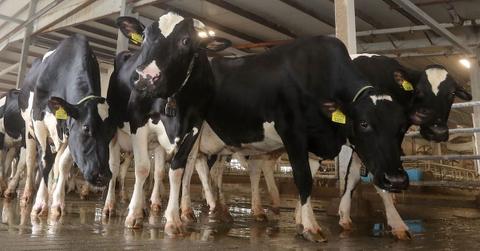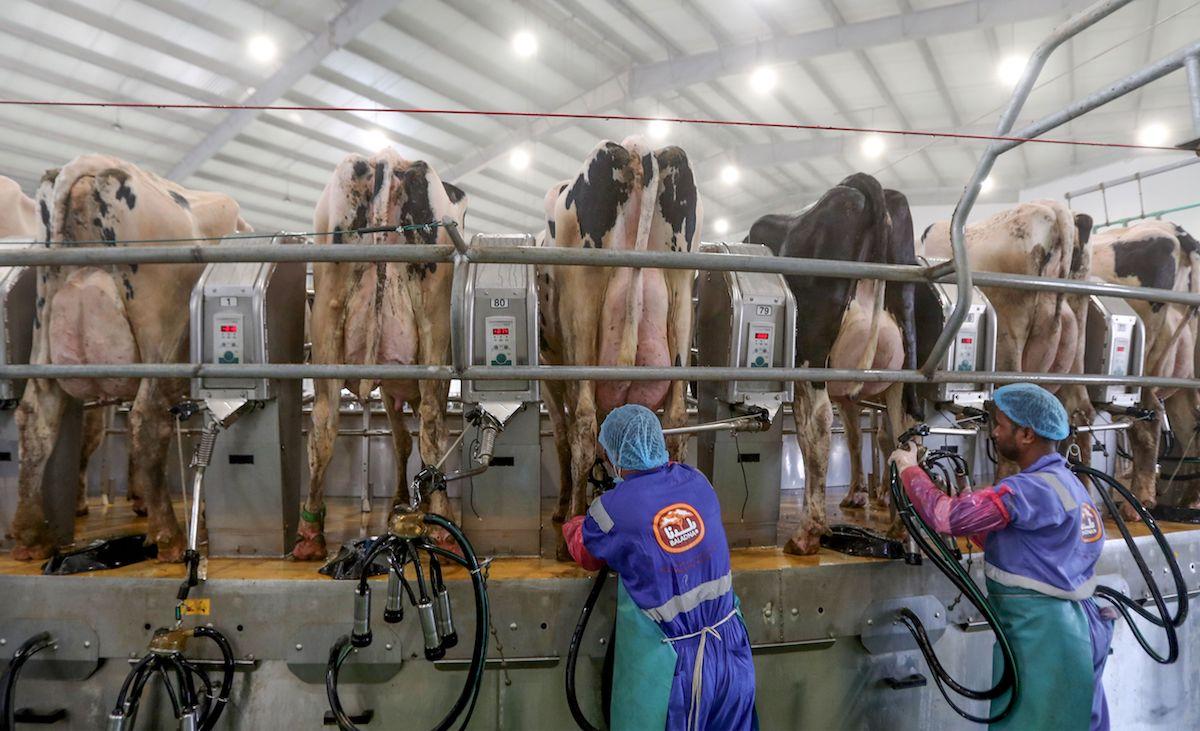The Dairy Industry Is Dumping Truckloads of Milk — And It’s Hurting Fish
Dairy farmers are dumping out unpasteurized milk by the truckload, which is polluting waterways and killing fish.
Updated April 7 2020, 11:44 a.m. ET

With the novel coronavirus causing a shift in market demands, dairy industry workers all over the U.S. are pouring truckloads of cow’s milk down drains and into fields. As if that wasn’t wasteful enough, governments are now warning the dairy industry that raw, unpasteurized milk entering the water system could kill fish.
Footage and photos of the dairy industry emptying trucks filled with milk have gone viral during the COVID-19 quarantines. But with so many people stocking up on groceries and dairy aisles emptying out in supermarkets, why are dairy farmers dumping milk?
Why are dairy farmers dumping milk?
As reported by The New York Post, dairy farmers are getting rid of milk that would usually be pasteurized and turned into drinkable milk, cream, butter, cheese, etc. for schools, restaurants, and other places that have shut down due to coronavirus lockdowns.
Schools and businesses are understandably canceling orders for dairy products, since no one will be there to consume it. So with the demand for milk down, farmers are still milking cows, but dumping the milk.
Why are farmers still milking cows?
Because they are still spending money to feed, shelter, and hydrate the cows, dairy farmers are continuing to keep cows hooked up to milk machines and continuing to take their milk.
The entire point of the dairy industry is to make a profit. To stop milking cows would guarantee zero profits — and more importantly, it would mean losing the government subsidies that keep the dairy industry alive — so the farmers are continuing the cruel cycle of milking cows to keep up their milk supply, in hopes that the market will turn around soon and there will be a need for their milk.
How dumped dairy milk is hurting fish:
Crying over spilled milk may actually be warranted in this case — at least for fish.
As noted by Earther, a memo shared by the Wisconsin Dept. of Natural Resources explains that dumping milk outdoors or down drains presents several environmental concerns, because that milk is making its way into rivers, streams, and other waterways.
To waterways, unpasteurized milk is a pollutant, similar to manure or wastewater. In fact, compared to manure, milk has higher biochemical oxygen demand (BOD) and higher concentrations of nutrients, as well as a strong odor. These factors can hurt surface water and lower the water’s oxygen levels — all of which can kill fish, according to the department.
Do cows need to be milked?

Cows produce milk for the same reason that women produce milk: to nurse their babies. To get a female cow to produce milk, farmers forcibly impregnate them. After mother cows give birth, farmers take their calves away to prevent them from nursing, and taking the milk that the industry wants to sell to humans. Male calves are typically sent to the veal industry, where they will live in a “veal crate” for 18 to 20 weeks before being slaughtered for veal. As for female calves, farmers will artificially inseminate them as soon as they have matured, and they will also become “dairy” cows. Once cows have been impregnated several times and their milk supply slows down, they will be slaughtered and become low-quality beef and hamburgers.
So no, cows do not produce milk out of nowhere, nor do they need to be milked — the only reason they produce milk is because they have been impregnated. Like any other mammal, they can wean off of milk production.
With the demand for milk considerably down during the quarantines, it would be great if farmers experiencing a reduced demand will prompt them to reduce their supply, and stop breeding, impregnating, and milking cows. Not only would this obviously be great for the cows, but it would also be great for all the fish who are being impacted by the new pollutant entering their water, and it would be great for the planet, considering the dairy industry’s high environmental impact. But with the U.S. government giving the dairy industry about $22.2 billion dollars in subsidies every year — and the government expected to give billions of more dollars to the agriculture sector due to the coronavirus — it's hard to say if the pandemic will significantly hurt the dairy industry.